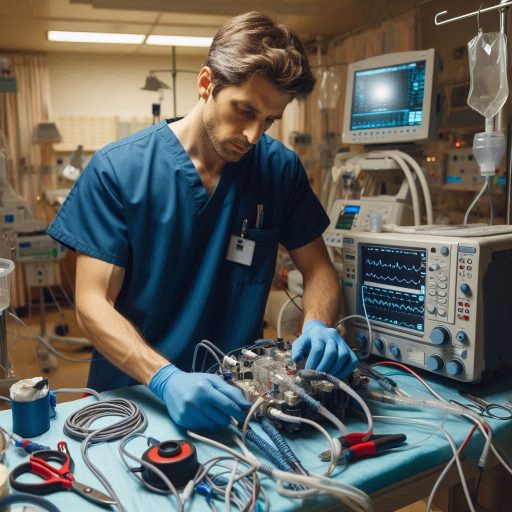Introduction
Biomedical equipment technicians (BMETs) play a crucial role in the healthcare system by maintaining and repairing medical devices for Biomedical Equipment Technicians Job Market
Their work ensures that complex machinery, such as MRI scanners, infusion pumps, and diagnostic tools, operates safely and efficiently.
This role is essential for supporting healthcare providers and ensuring high-quality patient care.
As medical technology advances, the demand for skilled BMETs continues to grow, making their expertise increasingly valuable.
Staying updated on job market trends is vital for BMETs to navigate career opportunities and industry shifts.
Awareness of these trends helps technicians understand emerging opportunities, salary expectations, and the impact of technological advancements.
Keeping abreast of these changes allows BMETs to make informed career decisions, pursue relevant training, and adapt to evolving industry needs.
This blog post will explore current job market trends for BMETs.
We will highlight factors influencing employment opportunities, such as technological advancements, industry growth, and regional demand.
By examining these trends, we aim to provide valuable insights for current professionals and those considering a career in biomedical equipment technology.
Understanding these trends will help BMETs plan their career paths effectively and stay competitive in a dynamic job market.
Overview of Biomedical Equipment Technician Roles
- Responsibilities of biomedical equipment technicians
- Importance of their role in healthcare facilities
- Demand for skilled technicians in the healthcare industry
Responsibilities of Biomedical Equipment Technicians
Biomedical equipment technicians are responsible for installing, maintaining, and repairing medical equipment used in healthcare settings.
They perform routine inspections, calibrations, and preventative maintenance activities to ensure that medical equipment functions optimally.
These technicians troubleshoot and diagnose equipment malfunctions, replacing parts as needed and documenting all repairs.
They also ensure regulatory compliance and adhere to safety protocols to guarantee the proper functioning of critical medical devices.
Importance of Their Role in Healthcare Facilities
Biomedical equipment technicians play a crucial role in the healthcare industry by ensuring that medical equipment operates efficiently and accurately.
They are essential in the diagnosis and treatment of patients, as healthcare providers rely heavily on accurate equipment for patient care.
These technicians help healthcare facilities maintain quality standards and operational efficiency by keeping equipment in optimal condition.
Their expertise and attention to detail contribute to the overall effectiveness of patient care and support healthcare professionals in delivering high-quality services.
Demand for Skilled Technicians in the Healthcare Industry
The demand for skilled biomedical equipment technicians is on the rise due to advancements.
Healthcare facilities are continuously upgrading their equipment and seeking qualified technicians to install, maintain, and repair these sophisticated devices.
As more healthcare facilities invest in state-of-the-art medical equipment, the need for highly skilled technicians who can troubleshoot.
Biomedical equipment technicians with specialized training and certifications are in high demand to support the evolving needs of the healthcare industry.
In addition, biomedical equipment technicians play a vital role in ensuring the safety and efficacy of medical equipment in healthcare facilities.
The demand for skilled technicians continues to increase, highlighting the importance of their contributions to the healthcare industry.
Current Job Market Trends for Biomedical Equipment Technicians
Growth of the healthcare industry
The healthcare industry is experiencing robust growth, which positively impacts job opportunities for Biomedical Equipment Technicians (BMETs).
Increased healthcare spending drives the demand for advanced medical equipment.
As healthcare facilities expand, they require more technicians to maintain and support their devices.
The rise in healthcare facilities, including hospitals, clinics, and specialized centers, contributes to a higher need for BMETs.
More facilities mean more medical equipment that needs regular inspection, maintenance, and repair.
This growth creates numerous career opportunities for BMETs.
Increasing Adoption of Technology in Healthcare Facilities
Technology adoption in healthcare facilities is accelerating, fueling demand for skilled BMETs.
Medical facilities increasingly rely on advanced technologies, such as diagnostic imaging and automated systems.
These technologies require ongoing support, maintenance, and upgrades from BMETs.
Advanced technologies, such as telemedicine and robotic surgery, require specialized knowledge and skills.
BMETs must stay updated on the latest innovations to effectively manage and support these technologies.
This trend leads to a growing need for technicians who can handle sophisticated medical devices.
Impact of COVID-19 on the Demand for Medical Equipment
The COVID-19 pandemic has significantly influenced the demand for medical equipment and, consequently, for BMETs.
The pandemic has highlighted the critical role of medical devices in patient care and crisis management.
Increased use of ventilators, monitoring equipment, and diagnostic tools has driven up the demand for technicians.
BMETs have played a crucial role in ensuring that critical equipment is available, functional, and properly maintained.
The pandemic‘s impact has underscored the importance of having skilled technicians to support healthcare operations during emergencies.
This increased demand is likely to continue as healthcare systems adapt and expand their capabilities.
Read: Field vs. Office Work in Surveying and Mapping
Required Skills and Qualifications
Technical Skills in Troubleshooting and Repairing Medical Equipment
Technical skills in troubleshooting and repairing medical equipment are crucial for Biomedical Equipment Technicians (BMETs).
Mastering these skills involves understanding complex systems and diagnosing issues efficiently.
Familiarize yourself with various types of medical devices, such as imaging systems, life-support equipment, and diagnostic tools.
Troubleshooting requires a systematic approach to identify and resolve problems.
Develop skills in analyzing error codes, performing diagnostic tests, and repairing faulty components.
Hands-on experience with equipment and simulations enhances your ability to address technical issues effectively.
Regularly practicing and updating your skills ensures you can handle the latest technologies and challenges in the field.
Knowledge of Medical Terminology and Standards
A thorough knowledge of medical terminology and standards is essential for BMETs.
Understanding medical terminology helps you communicate effectively with healthcare professionals and interpret technical documentation.
Familiarize yourself with terms related to anatomy, physiology, and medical procedures.
Adherence to industry standards ensures that you maintain high levels of safety and compliance.
Be aware of standards set by organizations like the Association for the Advancement of Medical Instrumentation (AAMI) and the International Organization for Standardization (ISO).
These standards guide equipment maintenance, calibration, and safety procedures.
Staying updated with these standards is crucial for ensuring the safe and effective operation of medical equipment.
Certification and Educational Requirements
Certification and educational requirements play a significant role in the job market for BMETs.
Most positions require a high school diploma or equivalent, followed by specialized training.
Pursue an associate degree in biomedical equipment technology or a related field to gain a solid foundation.
Certifications are highly valued and often required by employers.
The Certified Biomedical Equipment Technician (CBET) credential, offered by the AAMI, is one of the most recognized certifications.
This certification demonstrates your expertise in biomedical equipment and adherence to industry standards.
Other relevant certifications include the Certified Radiology Equipment Specialist (CRES) and the Certified Laboratory Equipment Specialist (CLES).
Continuing education is important for career advancement and staying current with technological advancements.
Many BMETs pursue additional certifications or advanced degrees to enhance their skills and job prospects.
Ongoing professional development helps you adapt to new technologies and maintain a competitive edge in the job market.
Read: Importance of Accuracy in Surveying and Mapping
Salary and Job Outlook
Average Salary Range for Biomedical Equipment Technicians
Biomedical Equipment Technicians (BMETs) earn competitive salaries that vary based on experience and location.
The average salary for BMETs in the United States is around $60,000 per year.
Entry-level positions typically offer salaries between $45,000 and $55,000 annually.
As BMETs gain experience, their salaries can increase to $55,000 to $70,000.
Experienced BMETs or those with specialized skills may earn over $80,000 annually.
Location also impacts salary, with metropolitan areas often offering higher pay due to the higher cost of living.
For example, BMETs in cities like San Francisco or New York City may earn above $70,000 per year.
In contrast, salaries in rural areas might be lower but still competitive within those regions.
Projected Job Growth in the Field
The job market for BMETs is strong and expected to grow.
This growth is driven by the increasing complexity of medical equipment and the rising demand for healthcare services.
Advancements in medical technology and an aging population contribute to this positive outlook.
As hospitals and healthcare facilities expand, the need for BMETs to maintain and repair sophisticated equipment will continue to rise.
The demand for BMETs ensures a steady flow of job opportunities in various healthcare settings.
Opportunities for Advancement and Career Development
BMETs have multiple avenues for career advancement and development.
Gaining specialized certifications can open doors to higher-level positions and increased salaries.
Certifications such as Certified Biomedical Equipment Technician (CBET) or Certified Radiology Equipment Specialist (CRES) are highly regarded in the field.
Pursuing additional education, such as a bachelor‘s or master‘s degree in biomedical engineering or a related field, can also lead to advancement.
Advanced degrees can qualify BMETs for managerial roles or positions in research and development.
BMETs can also explore opportunities in different sectors, including medical device manufacturing, research institutions, or governmental agencies.
Transitioning to roles like biomedical engineering or technical consulting can provide new challenges and higher earning potential.
Networking with industry professionals and joining relevant associations can further enhance career development.
Engaging with professional organizations offers access to industry updates, job leads, and mentoring opportunities.
Staying current with technological advancements and participating in ongoing education will ensure continued growth and success in the field.
Read: Surveying and Mapping Technician: Job Satisfaction

Industry Specializations
Different Areas Within the Healthcare Industry for Specialization
Biomedical Equipment Technicians (BMETs) can specialize in various areas within the healthcare industry.
Common specializations include radiology, where technicians focus on imaging equipment like X-rays and MRIs.
Another area is anesthesia, where BMETs manage and maintain anesthesia machines used during surgeries.
BMETs can also work in dialysis, handling the specialized equipment used for kidney treatments.
Other specialties include surgical instrumentation, where technicians ensure the proper functioning of surgical tools.
Specializing in these areas allows BMETs to develop expertise in specific types of medical equipment, meeting the diverse needs of healthcare facilities.
Emerging Technologies and Equipment in the Field
The field of biomedical equipment is rapidly evolving with emerging technologies.
Innovations such as advanced imaging systems, robotic surgery tools, and wearable health monitors are becoming increasingly prevalent.
These technologies require specialized knowledge for installation, maintenance, and repair.
For example, new imaging technologies like 3D ultrasound and high-resolution MRI systems offer improved diagnostic capabilities.
Robotic surgical systems, such as the da Vinci Surgical System, provide precision in minimally invasive surgeries.
Wearable health devices, including smartwatches and fitness trackers, monitor patient health in real-time.
BMETs who stay updated on these advancements can enhance their skills and career prospects.
Advantages of Gaining Specialized Knowledge and Skills
Gaining specialized knowledge and skills offers significant advantages in the BMET field.
Specialization enhances job security by meeting the specific needs of healthcare providers.
Facilities often seek experts in specialized equipment to ensure optimal performance and compliance with regulations.
Specialized BMETs may also enjoy higher salaries and better job prospects.
Expertise in high-demand areas can lead to advanced positions and leadership roles.
Additionally, specialized skills make BMETs more competitive in the job market, as they can handle complex and cutting-edge equipment.
Moreover, specialized knowledge allows BMETs to contribute more effectively to patient care.
By ensuring the reliability and accuracy of advanced medical technologies, technicians play a crucial role in improving patient outcomes.
This contribution can lead to greater job satisfaction and professional recognition.
Read: Online Courses for Surveying and Mapping Technicians
Transform Your Career Today
Unlock a personalized career strategy that drives real results. Get tailored advice and a roadmap designed just for you.
Start NowJob Search Strategies and Resources
Where to Find Job Openings for Biomedical Equipment Technicians
Finding job openings for Biomedical Equipment Technicians (BMETs) involves exploring multiple resources.
Start by visiting job boards dedicated to healthcare and technology positions.
Websites like Indeed, Glassdoor, and LinkedIn offer extensive listings for BMET roles.
Industry-specific job boards, such as those from the Association for the Advancement of Medical Instrumentation (AAMI), also provide targeted opportunities.
These platforms often list positions at hospitals, clinics, and research facilities.
Company websites and career pages are valuable resources.
Check the career sections of healthcare providers and medical equipment manufacturers for job postings.
Many organizations list openings exclusively on their websites.
Networking Tips for Connecting with Industry Professionals
Networking is crucial for finding job openings and advancing your career as a BMET.
Start by attending industry conferences and workshops.
Events such as AAMI conferences or regional medical technology expos provide opportunities to meet professionals and learn about job openings.
Engage actively on LinkedIn.
Connect with BMETs, healthcare professionals, and industry leaders.
Join relevant groups and participate in discussions to increase your visibility and make valuable connections.
Reach out to alumni from your educational institutions.
Many schools have career services and alumni networks that can provide job leads and advice.
Utilize these connections to tap into job opportunities and industry insights.
Consider joining professional organizations related to biomedical equipment.
Organizations like AAMI and the International Association of Biomedical Technology offer networking events, resources, and job boards.
Resources for Staying Informed About Job Market Trends
Staying informed about job market trends is essential for career advancement.
Subscribe to industry newsletters and publications.
Sources like AAMI‘s newsletter or medical technology journals provide updates on industry trends, job market shifts, and emerging technologies.
Follow relevant blogs and online forums.
Websites such as MedPage Today and Health IT News offer insights into healthcare technology trends and job market changes.
Engaging with these resources helps you stay updated on industry developments and job opportunities.
Use professional social media platforms to stay connected.
LinkedIn, for instance, offers features like job alerts and industry news updates.
Customize your feed to follow companies and influencers in the biomedical equipment field.
Attend webinars and online seminars.
These events often cover current job market trends and industry developments.
Participating in these sessions provides valuable information and keeps you informed about job opportunities.
Continuing Education and Professional Development
Importance of Staying Updated on Industry Trends and Advancements
Staying updated on industry trends and advancements is crucial for Biomedical Equipment Technicians (BMETs).
Medical technology evolves rapidly, introducing new devices and procedures.
Keeping abreast of these changes ensures that BMETs remain proficient and can effectively maintain and repair the latest equipment.
Awareness of industry trends helps technicians anticipate future needs and adapt their skills accordingly.
This proactive approach enhances their job performance and career longevity.
Being informed about technological advancements also positions BMETs to seize new opportunities and stay competitive in a dynamic job market.
Opportunities for Ongoing Training and Education
Opportunities for ongoing training and education are abundant for BMETs.
Many professional organizations offer workshops, seminars, and online courses focused on the latest technological developments and best practices.
Continuing education helps technicians stay current with emerging technologies, regulatory changes, and advanced repair techniques.
Institutions and manufacturers also provide specialized training tailored to specific medical devices.
Engaging in these educational opportunities not only improves technical skills but also supports career growth.
Regular participation in training ensures BMETs are prepared for new challenges and can maintain a high standard of service.
Benefits of Pursuing Certifications and Advanced Degrees
Pursuing certifications and advanced degrees offers significant benefits for BMETs.
Certifications, such as the Certified Biomedical Equipment Technician (CBET) credential, validate expertise and demonstrate a commitment to professional standards.
They enhance job prospects, leading to increased opportunities for career advancement and higher salaries.
Advanced degrees, such as a Master‘s in Biomedical Engineering, open doors to specialized roles and leadership positions within the field.
Both certifications and advanced degrees provide BMETs with a competitive edge, ensuring they have the knowledge and skills needed to excel in a rapidly changing industry.
Obtaining these credentials also reflects a dedication to personal and professional growth.
Employers often value certified and advanced-degree holders for their comprehensive knowledge and ability to manage complex medical equipment.
The benefits of pursuing further education and certifications extend beyond immediate career advancement.
Contributing to long-term success and satisfaction in the biomedical equipment technology field.
Learn More: Advancing Your Career as an Industrial Mechanic
Conclusion
The job market for biomedical equipment technicians is experiencing notable growth, driven by increasing healthcare demands and technological advancements.
Technicians play a vital role in maintaining and repairing essential medical devices, which directly impacts patient care and operational efficiency.
The rising complexity of medical equipment and the expanding healthcare sector are fueling a steady demand for skilled professionals in this field.
It is crucial for biomedical equipment technicians to stay informed about current job market trends.
The industry evolves rapidly with new technologies and changing regulations, making continuous learning essential.
By regularly updating your skills and knowledge, you can enhance your career prospects and remain competitive.
Engaging in professional development activities, such as additional certifications and attending industry conferences, will help you keep pace with these changes.
Looking ahead, the future for biomedical equipment technicians is very promising.
As healthcare technology continues to advance, the demand for qualified technicians is expected to grow.
Emerging technologies such as telemedicine and advanced diagnostic tools will further drive this demand.
[E-Books for Sale]
The Big Book of 500 High-Paying Jobs in America: Unlock Your Earning Potential
$19.99 • 500 High-Paying Jobs • 330 pages
Explore 500 high-paying jobs in America and learn how to boost your career, earn more, and achieve success!
See All 500 High-Paying Jobs of this E-Book
1001 Professions Without a Degree: High-Paying American Jobs You Can Start Now
$19.99 • 1001 Professions Without a Degree • 174 pages
Discover 1001 high-paying jobs without a degree! Unlock career tips, skills, and success strategies for just $19.99!




